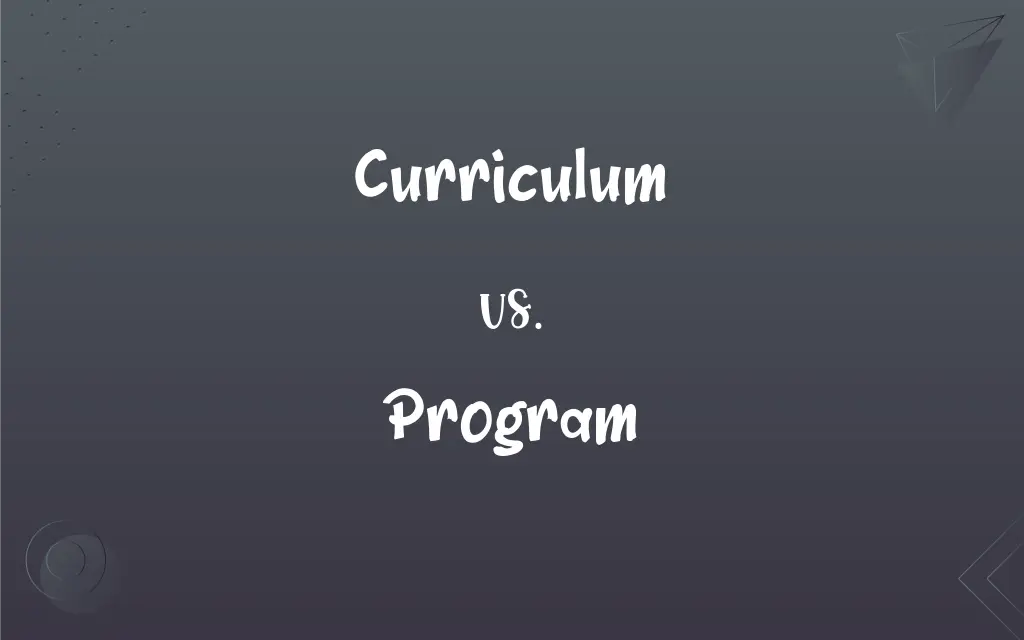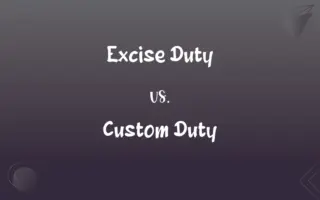Curriculum vs. Program: What's the Difference?
Edited by Harlon Moss || By Janet White || Published on December 13, 2023
Curriculum refers to the subjects and content taught in a school or course, while a program is a set of courses or activities designed to achieve educational goals.

Key Differences
Curriculum encompasses the specific set of courses and their content offered by an educational institution. It defines what is taught, including subjects, course materials, and learning objectives. Program, on the other hand, refers to the structured plan of study or activities within an educational setting, which may consist of multiple curricula.
The curriculum is often detailed and specific, outlining the topics, skills, and knowledge to be imparted in a particular course or subject. While, programs describe the broader educational or training path, including the sequence of courses, degree requirements, and overall educational objectives.
In education, a curriculum is typically designed by subject matter experts and educators, focusing on the academic content and pedagogical approaches. A program is often developed by educational institutions or organizations to achieve specific educational outcomes, encompassing various curricula.
Curriculum is more about the "what" of education – the content and subjects that students will learn. Program is more about the "how" – the structure and organization of the educational experience, which includes the delivery of the curriculum.
The evaluation of a curriculum usually revolves around the effectiveness and relevance of the content taught. In contrast, evaluating a program often involves assessing its overall success in meeting educational goals, including the effectiveness of its curricula.
ADVERTISEMENT
Comparison Chart
Definition
Set of courses and content taught.
Structured plan of study or activities.
Focus
Specific subjects, materials, objectives.
Overall educational path and outcomes.
Design
By educators, focusing on academic content.
By institutions, for specific outcomes.
Role
"What" is taught (content, subjects).
"How" education is structured and delivered.
Evaluation
Based on content effectiveness.
Based on overall success in goals.
ADVERTISEMENT
Curriculum and Program Definitions
Curriculum
Educational content.
The new curriculum focuses on practical skills.
Program
Educational initiative
The literacy program aims to improve reading skills.
Curriculum
Subject matter.
The art curriculum covers painting, sculpture, and photography.
Program
Organized set of activities
The summer program offers various workshops for students.
Curriculum
Academic requirements.
Graduation requires completing the designated curriculum.
Program
Structured course of study
She enrolled in a nursing program at the university.
Curriculum
Set of courses.
The school's curriculum includes math, science, and history.
Program
Degree plan
He completed his MBA program in two years.
Curriculum
Teaching plan.
Teachers developed a curriculum that emphasizes critical thinking.
Program
Training sequence
The internship program includes both theory and practical work.
Curriculum
All the courses of study offered by an educational institution.
Program
A listing of the order of events and other pertinent information for a public presentation.
Curriculum
A group of related courses, often in a special field of study
The engineering curriculum.
Program
The presentation itself
A program of piano pieces.
Curriculum
The set of courses, coursework, and their content, offered at a school or university.
Curriculum
(obsolete) A racecourse; a place for running.
Curriculum
A race course; a place for running.
Curriculum
A course; particularly, a specified fixed course of study, as in a university.
Curriculum
An integrated course of academic studies;
He was admitted to a new program at the university
FAQs
What is a curriculum?
A curriculum is a structured set of courses and content taught in an educational setting.
How does a program differ from a curriculum?
A program is a broader plan of study or activities, while a curriculum is the specific content and subjects within it.
What's the purpose of an educational program?
An educational program aims to achieve specific educational goals and outcomes.
Who designs a curriculum?
A curriculum is typically designed by educators and subject matter experts.
Is curriculum only academic?
Primarily, but it can also include practical skills and extracurricular activities.
Can programs be customized?
Yes, programs can be tailored to meet specific educational or training needs.
Do all schools follow the same curriculum?
No, curricula can vary significantly between schools and regions.
Can a program contain multiple curricula?
Yes, a program can include multiple curricula, covering different subjects or courses.
Are programs longer than curricula?
Generally, programs encompass a longer period, including multiple curricula.
Can a program be interdisciplinary?
Yes, programs can be interdisciplinary, combining different academic fields.
How do you assess a curriculum's effectiveness?
By evaluating how well it meets learning objectives and student needs.
What factors influence program design?
Program design can be influenced by educational goals, student needs, and industry demands.
Can a curriculum change within a program?
Yes, curricula within a program can be updated or modified over time.
How often is a curriculum updated?
It varies, but curricula are often reviewed and updated periodically to remain relevant.
Are vocational programs different from academic programs?
Yes, vocational programs focus more on practical skills and trades, while academic programs are more theory-based.
Does a program always lead to a degree?
Not always. Some programs offer certificates or diplomas instead of degrees.
Is curriculum the same as syllabus?
No, a syllabus is more specific, usually outlining a particular course within a curriculum.
Can curricula be standardized?
Some elements of curricula can be standardized, especially in public education systems.
Can online education have a different curriculum?
Yes, online education may have a curriculum adapted for virtual learning environments.
How important is curriculum in education quality?
Curriculum is crucial as it directly impacts what and how students learn, influencing education quality.
About Author
Written by
Janet WhiteJanet White has been an esteemed writer and blogger for Difference Wiki. Holding a Master's degree in Science and Medical Journalism from the prestigious Boston University, she has consistently demonstrated her expertise and passion for her field. When she's not immersed in her work, Janet relishes her time exercising, delving into a good book, and cherishing moments with friends and family.
Edited by
Harlon MossHarlon is a seasoned quality moderator and accomplished content writer for Difference Wiki. An alumnus of the prestigious University of California, he earned his degree in Computer Science. Leveraging his academic background, Harlon brings a meticulous and informed perspective to his work, ensuring content accuracy and excellence.






































































